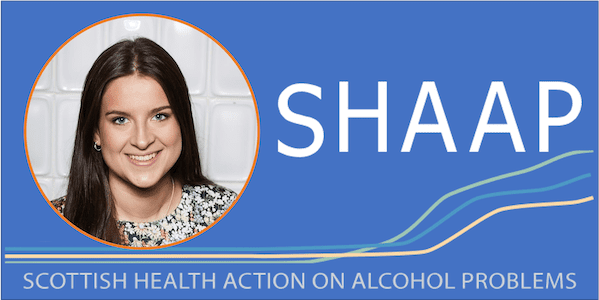
There is no doubt about it, alcohol harms are one of the biggest public health issues currently being faced in Scotland. Every day, almost 100 people are hospitalised and 3 people die purely because of alcohol, and if you include those incidences where alcohol has played a part, the true alcohol death toll is at least 3 times higher.
Most of these tragic and avoidable deaths also occur in people of working age, making alcohol a leading cause of premature death in Scotland. Whilst a fatal outcome is the most tragic demonstration of harms, the adverse impact on society is much wider, affecting not only people suffering alcohol problems but also those around them. In reality, everyone in Scotland knows someone whose life has been damaged by alcohol. We simply cannot continue to accept these harms as the Scottish reality.
The good news?
The good news is, these harms are preventable, and the World Health Organization cites restrictions to alcohol marketing as one of their ‘best buys’ in cost-effectively reducing alcohol harms. Why then, are we not jumping at the chance to implement this clear strategy to improve the crisis we are facing with alcohol?
Alcohol marketing works: it causes us to buy and consume more alcohol. Why else would the alcohol industry invest billions each year in promoting their products? Alcohol marketing is internationally evidenced to directly influence how much and how often we consume alcohol and is particularly problematic for children, young people, and people in recovery.
Alcohol marketing presents a human rights issue: we do not consent to being exposed to something which is evidenced to influence our health-related behaviours and lead to harms. Is it any wonder that Scotland has a broken relationship with alcohol when we face constant reminders of alcohol everywhere we go in Scottish society? We simply cannot go about our day without noticing alcohol advertising – it’s in our outdoor and public spaces, at sports games and events, on our transport, on TV and radio, online, in newspapers, the list goes on…
Industry hysteria
The Scottish Government published its consultation on alcohol advertisement and promotion in November, setting out a broad and progressive set of proposals to protect Scottish society from exposure to alcohol marketing.
However, upon immediate release of these proposals, the alcohol industry made it their mission to undermine the consultation with a barrage of unfounded claims in the media. This is reminiscent of the industry media storm which was unleashed when Minimum Unit Pricing (MUP) was first proposed. The alcohol industry is making the same unfounded claims which centre around the economic impact of population-wide proposals to reduce alcohol harms.
As with MUP, the industry is arguing that the proposed measures would result in economic devastation. In reality, alcohol harms are costing Scotland as much as the industry contributes in GDP. Alcohol harms are estimated to cost Scotland between £4.9 and £.9.6 billion every year in societal costs, including health and social care costs, labour and productivity loss, and crime costs. Additionally, the poorest members of Scottish society are bearing the brunt of this, and alcohol deepens existing health inequalities.
Industry claims around the economic impact of MUP were proven unfounded through the release of the Public Health Scotland evaluation report last year which found no evidence that MUP had negatively impacted the alcohol industry and that, in fact, the industry had adapted quickly and effectively.
As with MUP, the economic claims made by the industry around marketing restrictions are extremely weak and the Scottish Government should not be deterred from implementing comprehensive restrictions on alcohol marketing on this basis. The cost of reducing alcohol sales in Scotland would likely be more than offset by the savings in healthcare costs and the gains from a healthier workforce. In our current model of society, alcohol is costing as much as it is contributing and this should not be allowed to continue.
Indeed, many of our European neighbours have already grasped the nettle and now have varying degrees of regulation of alcohol marketing. Recognising their responsibility to protect citizens, countries such as Norway, Sweden, Finland, France, Estonia, Lithuania and Ireland are setting an example of how effective such measures can be in changing the societal relationship with alcohol and reducing harms.
Presently, we see the marketing proposals being used as ammunition in the SNP leadership debate. Two – if not all three – of the candidates have seemingly been taken in by the alarmist claims of the alcohol industry and have come out to criticise the proposals.
Undermining public health gains
The Scottish Government’s alcohol strategy is widely regarded as world-leading, implementing progressive restrictions on promotions, licensing and most markedly the introduction of MUP. The SNP leadership candidates should seize the opportunity to build on this legacy. Rowing back on the alcohol marketing proposals now would hugely undermine the public health gains which have been made whilst the SNP have been in government.
The recent release of the alcohol-related hospital admissions data made clear that immediate and drastic attention is required to address the epidemic which Scotland is facing with alcohol harms. In the aftermath of the COVID-19 pandemic and resulting changes to alcohol consumption patterns in Scotland, now is not the time for the SNP to turn their back on addressing Scotland’s problem with alcohol. It is imperative that whoever becomes our new First Minister not only upholds Scotland’s reputation as world-leaders in alcohol policy, but does the right thing by Scottish people in delivering their manifesto commitment to protect children from alcohol advertisement.
Written by Jane Gordon, Policy and Public Affairs Officer, Scottish Health Action on Alcohol Problems (SHAAP).
All IAS Blogposts are published with the permission of the author. The views expressed are solely the author’s own and do not necessarily represent the views of the Institute of Alcohol Studies.
